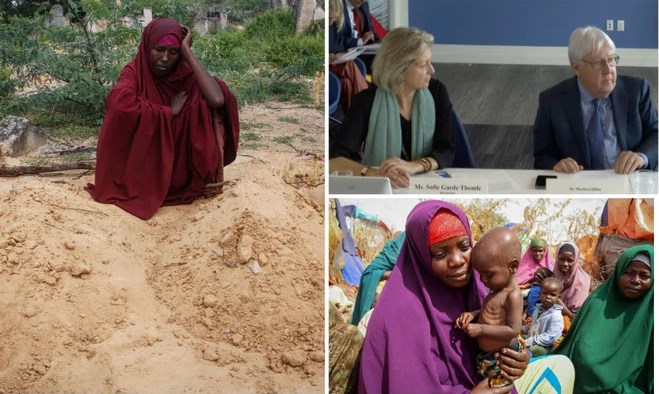
Wednesday September 14, 2022

UN relief chief Martin Griffiths (top right), on his first visit to Somalia described the level of suffering as “truly shocking.” (AFP/UNTV)
LONDON: Somalia faces widespread malnutrition and death as a result of a worsening drought crisis if international funding is not increased, a UN briefing on the crisis has heard.
Held virtually on Wednesday, the meeting included Undersecretary-General for Humanitarian Affairs and Emergency Relief Coordinator Martin Griffiths, as well as Somalia’s first Special Envoy for Drought and Climate Change Abdirahman Abdishakur Warsame.
Representatives from USAID, the EU, Germany, Denmark, Turkey, the UK and more were also present during the briefing.
advertisements
It followed a recent visit by Griffiths to the drought-stricken country, which has recorded the internal displacement of more than 1 million people as a result of the crisis.Griffiths, on his first visit to Somalia, traveled to Mogadishu as well as the southwest of the country, which has borne the brunt of the drought.
He described the level of suffering as “truly shocking,” recounting visits to regional hospitals where children “were so malnourished that they could barely cry.”
As a result of the worsening drought, many Somalis have “lost hope in getting the next meal or looking after children,” Griffiths said, adding that in extreme cases, parents have carried children for hundreds of kilometers to receive medical care.
Medical staff are struggling to deal with the numbers of emaciated children entering hospitals, in scenes that Griffiths said he hoped “had the power to shock us.”
In order to deal with the crisis that could devastate Somalia, Ethiopia and parts of Kenya, he added that the humanitarian response must be “scaled up” across four clusters: Security, nutrition, health and water.
“We’ve arrived at arguably the most dangerous period in this crisis,” Griffiths said, warning that famine will likely be declared in two Somali regions from October unless a humanitarian response is urgently prepared. By the time a famine is declared, “tens of thousands of Somalis may have died,” he said.
An immediate funding figure of $1 billion is necessary to save lives and ensure that Somalia remains stable through the first months of 2023, Griffiths added.
Another concern is the presence of terror group Al-Shabab in Somalia’s remote regions, with the UN coordinator stressing the difficulty in rolling out urgent aid as a result of insecurity.
Griffiths ended his remarks by calling for “parallel efforts” alongside humanitarian aid to increase the resilience of vulnerable communities in Somalia.
Cycles of droughts and floods are intensifying, placing pastoralism as a way of life under existential threat, he said.
Griffiths praised the work of the Somali government, including Warsame, as well as international partners including USAID and the EU.
Warsame told the audience that the “Horn of Africa is suffering,” and that the hunger crisis and “senseless violence” of Al-Shabab could erode Somalia’s progress “before it unleashes its full potential.”
He said after visiting the worst-affected regions in Somalia, it became apparent that children aged under 10 were facing the highest levels of malnutrition.
Though thankful to the international community for existing funding, Warsame echoed Griffiths’ warning that fresh humanitarian assistance was urgently needed to stave off disaster.
“We’ll never break out of this cycle of crisis unless funding is met,” Warsame said, praising the Somali diaspora and calling for individual and business expertise to aid in relief efforts.
Somalis are “tired of having to depend on others to survive,” he added, acknowledging that “we have an immense undertaking ahead of us.”